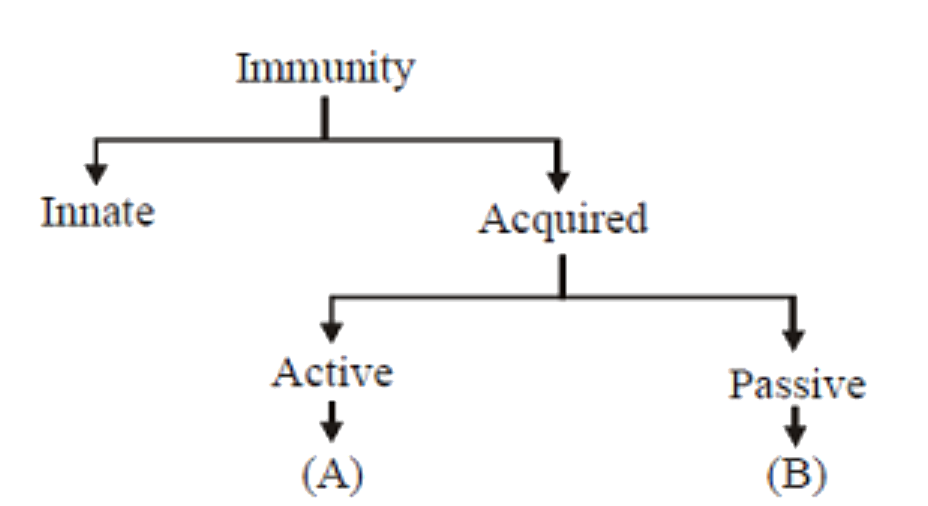Why does a doctor administer tetanus antitoxin and not a tetanus vaccine to a person injured in a roadside accident with a bleeding wound? Explain.
Step-by-Step Solution:
1. Understanding the Situation: When a person is injured in a roadside accident, especially with a bleeding wound, there is a risk of exposure to bacteria, particularly *Clostridium tetani*, which is commonly found in soil and can enter the body through open wounds.
2. Role of Tetanus Toxin: *Clostridium tetani* produces a potent toxin known as tetanus toxin. This toxin can cause severe muscle spasms and can be life-threatening if not treated promptly.
3. Immediate Treatment Needs: In the case of a fresh injury, the immediate concern is the presence of the tetanus toxin in the body. The body has not yet had time to mount an immune response against this toxin.
4. Tetanus Antitoxin Administration: The doctor administers tetanus antitoxin, which is a pre-formed antibody that can neutralize the tetanus toxin immediately. This is crucial for preventing the effects of the toxin from taking hold in the body.
5. Why Not Tetanus Vaccine?: Tetanus vaccine works by stimulating the immune system to produce its own antibodies against the toxin, but this process takes time (usually several weeks). Since the injury is recent and the toxin is already present, the vaccine would not provide immediate protection.
6. Duration of Vaccine Efficacy: Tetanus vaccines are typically effective for about six months to ten years, depending on the individual's vaccination history. However, in an acute situation where the toxin is already present, the vaccine is not the appropriate choice.
7. Conclusion: Therefore, the doctor opts for tetanus antitoxin to provide immediate neutralization of the toxin rather than a vaccine, which would not be effective in the acute phase of exposure.
Topper's Solved these Questions
- BOOK - ICSECHAPTER - HUMAN HEALTH AND DISEASE EXERCISE - PRACTICE QUESTIONS (Short Answer Type-II Questions)39videos
HUMAN HEALTH AND DISEASE
- BOOK - ICSECHAPTER - HUMAN HEALTH AND DISEASE EXERCISE - PRACTICE QUESTIONS (Long AnswerType Questions)24videos
HUMAN HEALTH AND DISEASE
- BOOK - ICSECHAPTER - HUMAN HEALTH AND DISEASE EXERCISE - PRACTICE QUESTIONS (Very Short Answer Type Questions)38videos
HUMAN HEALTH AND DISEASE
- BOOK - ICSECHAPTER - EVOLUTIONEXERCISE - COMPETITION CORNER (Assertion and Reason Type Questions (For AIIMS aspirants))26videos
EVOLUTION
- BOOK - ICSECHAPTER - HUMAN REPRODUCTIONEXERCISE - SOURCE BASED QUESTIONS22videos
HUMAN REPRODUCTION
Similar Questions
Assertion (A): A person who has received a cut and is bleeding needs to be given antitetanus treatment.
Reason(R): Antitetanus injection provides immunity by producing antibodies for tetanus.View SolutionA person likely to develop tetanus is immunized by administering anti-tetunus injection
or
When a quick immune response is required due to infection of a deadly microbes, the patient is injected withView Solution
Knowledge Check
- Question 1 - Select One
Read the following statements and select the correct ones.
(i) Vaccine is a preparation (or suspension ) of a dead/attenuated pathogen of a disease which on inoculation ( or injection ) into a healthy person, provides temporary/permanent active immunity by inducing antibodies formation.
(ii) Immunisation is the process by which the body produces antibodies against the vaccine preventable diseases through administration of specific vaccines.
(iii) The principle of immunisation or vaccination is based on the property of 'memory' of the immune system.
iv) If a person is infected with some deadly microbes to which quick immune response is required; in that case, we need to directly inject the performed antibodies or antitoxins e.g., in case of tetanus.A(i) and (ii)B(iii) and (iv)C(i), (ii) and (iii)D(i),(ii),(iii) and (iv) - Question 2 - Select One
A person likely to develop tetanus is immunised by administering
ADead GermsBPreformed antibodiesCWide spectrum antibioticsDWeakened germs
A person met with an accident and it was seen that continuous bleeding occured from an injured part of body . It may be due to deficiency of
View SolutionAccording to the third law of motion, when we push on an object, the object pushes back on us with an equal and opposite force. If the object is a massive truck parked along the roadside, it will probably not move. A student justifies this by answering that the two opposite and equal forces cancel each other. Comment on this logic and explain why the truck does not move.
View SolutionThe magnetic field inside a tightly wound, long solenoid is B= (mu_0)ni. It suggests that the field does not depend on the total length of the solenoid, and hence if we add more loops at the ends of a solenoid the field should not increase. Explain qualitatively why the extra added loops do not have a considerable effect on the field inside the solenoid.
View SolutionWrite the events that take place when a vaccine for any disease is introduced into the human body.
Or " "
Why is a person with cuts and bruises following an accident administered tetanus antitoxin? Give a reasons.View SolutionIdentify A and B.

(i) - Tetanus Toxoid
(ii) - Anti-tetanus serum
(iii) - Diphtheria, pertussis, and tetanus vaccine
(iv) - Antitoxin diphtheria serum
(v) - Bacillus Chalmette-Guerin (BCG) vaccineView SolutionA person injured in a road accident and requiring an urgent immune response was brought to a doctor.
What did the doctor immediately do?View Solution

